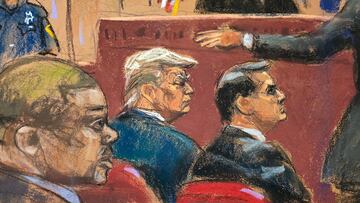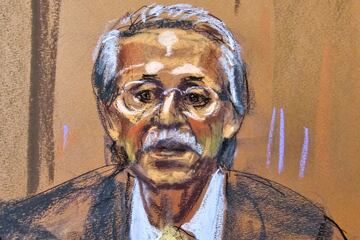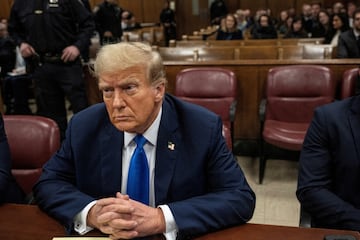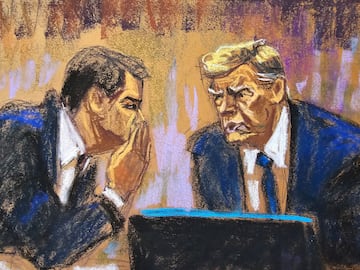CRIME
Who is David Pecker, the first witness in Donald Trump’s ‘hush money’ trial?
After the jury was finally agreed upon, the evidence and witness testimonies can be brought to the court, and there are some key names involved.

As the historic hush money trial involving former President Donald Trump unfolds in New York, a spotlight is cast on a diverse array of witnesses slated to take the stand. From former associates to adult film stars, each figure plays a crucial role in unraveling the intricate web of allegations surrounding Trump’s alleged efforts to suppress negative stories. And while the likes of Stormy Daniels and Micheal Cohen are well known to most, the name of David Pecker is only now reaching the attention of the average observer.
David Pecker: the tabloid titan
Pecker is the former CEO of American Media and publisher of the National Enquirer, emerges as a pivotal figure in the prosecution’s case. Allegedly a longtime confidant of Trump, Pecker is expected to provide key testimony regarding discussions at Trump Tower in 2015. Prosecutors claim these discussions revolved around the National Enquirer’s involvement in purchasing exclusive rights to negative stories about Trump and never publishing them—a practice dubbed the “catch and kill” scheme.

Pecker’s cooperation with federal investigators, including providing details about Cohen’s payment to Daniels, led to him being granted immunity in exchange for testimony.
Who are the other key witnesses in the Trump case?
Stormy Daniels: the Adult film star
Daniels, whose real name is Stephanie Clifford, gained notoriety for her claim of a 2006 sexual encounter with Trump. Central to the trial is the $130,000 payment she received from Cohen in exchange for her silence before the 2016 election. Cohen asserts that Trump directed the payment, while prosecutors allege Trump misclassified reimbursements to Cohen as legal expenses.
Daniels’ testimony is expected to shed light on the circumstances surrounding the payment and Trump’s involvement.
Michael Cohen: the fixer
Once Trump’s personal lawyer and fixer, Cohen now finds himself on the opposite side of the courtroom. Having paid Daniels out of his own pocket and orchestrated a non-disclosure agreement, Cohen’s guilty plea to campaign finance violations marks a critical turning point in the trial.
Cohen’s testimony, which implicates Trump in directing the hush money payments, provides a firsthand account of the events leading up to the alleged scheme.
Karen McDougal: the Playboy model
McDougal, a former Playboy model, adds another dimension to the trial with her claim of a 10-month affair with Trump in the mid-2000s.
Allegedly paid $150,000 by American Media for her story, McDougal’s testimony offers insight into the broader practice of burying unfavorable stories through financial arrangements. Though Trump denies the affair, McDougal’s account is poised to provide jurors with crucial context.
Hope Hicks: the Press Secretary
Hicks, Trump’s former press secretary and White House communications director, finds herself entangled in the trial’s narrative.
Reports suggest her participation in phone calls between Trump and Cohen, where discussions regarding the hush money payments allegedly took place. Hicks’ testimony could provide additional corroboration of Trump’s involvement in the scheme.
Donald Trump: The Defendant and potential witness
Perhaps the most anticipated witness of all is Donald Trump himself. Despite the risks involved, Trump has expressed his intention to testify—a move that could either bolster the prosecution’s case or provide him with an opportunity to refute allegations. With the November presidential election looming, Trump’s testimony could also serve as a platform to rally his supporters.

What do we know about the Trump jury?
Selecting a panel of twelve impartial US citizens for a case is already a daunting task. Doing so in Manhattan, where the former president garnered only 12.3 percent of the vote in 2020, posed even greater challenges. Nonetheless, a week into jury selection, the twelve individuals took their places and attentively followed the trial proceedings.
Little is known about the jurors’ identities, a deliberate measure to protect their privacy during the trial. It’s crucial that they feel secure in making their judgment solely based on the evidence and testimonies presented in court. Revealing their identities could subject them to harassment or bribery attempts, jeopardising the fairness of the trial and the defendant’s rights.

Before the oral arguments commenced, one juror withdrew after her involvement became public, highlighting the sensitivity of the matter. Jurors are instructed not to discuss the case outside the courtroom to prevent biases from influencing their decisions. Hence, we won’t delve into individual jurors’ characteristics but will discuss the group collectively, focusing on their reported views, interests, and backgrounds.
In the US legal system, the jury holds the responsibility of determining innocence or guilt. Both the prosecution and defense cooperated in selecting jurors, necessitating open discussions about their political leanings, especially concerning the former president. Those unable to remain impartial regarding Donald Trump were promptly excused. Among those selected, some openly expressed opposition to Trump’s politics but affirmed their ability to fulfill their civic duty impartially. Interestingly, many jurors appear to have a limited engagement with politics, possibly indicating a less polarized perspective on the former president.






